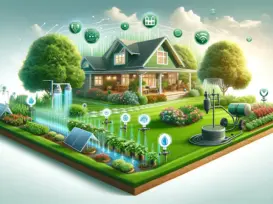Grus Home Energy - eco-friendly lawn care
Eco-Friendly Lawn Care: Sustainable Practices for a Greener Yard
As more and more people become aware of the environmental impact of traditional lawn care practices, the demand for eco-friendly solutions is on the rise. From reducing water consumption to eliminating harmful chemicals, there are several sustainable practices you can implement to maintain a healthy and beautiful lawn while minimizing your carbon footprint.
One of the first steps towards eco-friendly lawn care is reducing water usage. By watering your lawn less frequently but deeply, you can encourage deeper root growth and make your lawn more resilient to drought conditions. Consider investing in a rain barrel to collect rainwater for irrigation, or installing a drip irrigation system to deliver water directly to the roots of your plants.
Another important aspect of eco-friendly lawn care is choosing the right grass and plants for your climate. Native plants are adapted to local conditions and require less water and maintenance than exotic species. Additionally, planting a diverse range of species can support local wildlife and promote a healthy ecosystem in your yard.
When it comes to fertilizing your lawn, opting for organic or natural fertilizers is key to reducing your environmental impact. Chemical fertilizers can leach into groundwater and harm beneficial organisms in the soil. Look for products that are made from compost, manure, or other organic materials to provide your lawn with the nutrients it needs to thrive.
Weed control is another area where eco-friendly practices can make a big difference. Instead of relying on chemical herbicides, consider using mulch or manual weeding to keep weeds at bay. You can also spot-treat weeds with a vinegar-based solution or use a natural weed killer made from ingredients like salt and soap.
Finally, mowing your lawn with eco-friendly practices in mind can help reduce emissions and promote a healthier lawn. Consider using an electric or push mower instead of a gas-powered one to reduce your carbon footprint. Keep your mower blades sharp to ensure a clean cut that promotes healthy growth, and leave grass clippings on your lawn to provide natural nutrients for your plants.
Overall, eco-friendly lawn care is all about working with nature instead of against it. By implementing sustainable practices like reducing water usage, choosing native plants, using organic fertilizers, and minimizing chemical inputs, you can create a beautiful and healthy lawn that benefits both your family and the environment. So next time you head out to tend to your yard, consider how you can make a positive impact with your lawn care routine.
©2025 All Rights Reserved. Grus IoT Co.,Ltd.
